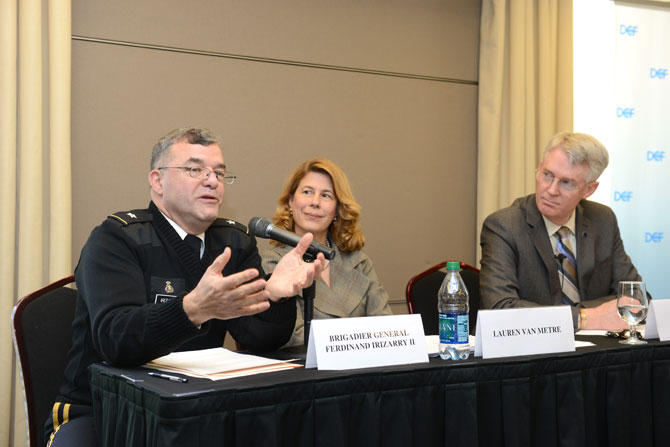The U.S. Institute of Peace (USIP) and the Reserve Officers Association held a joint program on Capitol Hill on February 12 to explore new education and training approaches to help U.S. troops better prepare for complex missions in fragile and conflict states.

The U.S. Institute of Peace (USIP) and the Reserve Officers Association (ROA) held a joint program at ROA headquarters on Capitol Hill on February 12 to explore new education and training approaches for U.S. troops who are preparing for complex, nontraditional missions to help stabilize fragile and conflict states.
USIP Chief of Staff Paul Hughes noted “the paradigm shift” underway in the U.S. Army and other uniformed services, comparing the traditional focus on training for warfighting skills with the more complicated and country-specific missions that troops are now facing in Afghanistan and elsewhere in the coming years. With the growing need for some American military units to work closely with host-country officials and civilians, other U.S. agencies and civil society organizations, Hughes said, these settings are “demanding new things from our young leaders every day.”
The program described USIP’s recent training of a unit of the U.S. Army’s 101st Airborne Division that will deploy to Afghanistan in a security advisory role at the village, district and provincial levels. The USIP training at Fort Campbell, Kentucky, in December was tailored to fit the Army’s changing mission in Afghanistan—particularly the transfer of primary security responsibility in 2014 from the U.S.-led international coalition to Afghan command—as well as the specific political, bureaucratic and cultural conditions the advisors will encounter there. The instruction marked the first time that USIP had dispatched an integrated team of conflict-management and country experts to train a military unit that will be sent to a conflict zone.
“These skills take a long time [to develop] and a lot of investment,” said Brigadier General Ferdinand Irizarry II, deputy commanding general of the Army’s John F. Kennedy Special Warfare Center and School, which is based at Fort Bragg, North Carolina. “We really need to birth a generation of planners and thinkers” who can function in non-traditional roles in such conflict zones as Somalia, Mali and elsewhere, he said. “We’re going to drive toward that.”
“It’s going to require some rethinking about how we’re organized and how we look at the world,” added Irizarry, who said the Army will “need people who understand how to create a capability”—such as building police departments and health systems.
The need for cultivating traditional soldiering skills such as marksmanship, jumping out of airplanes and small-unit tactics is well understood by budgeteers and others, but Army activities in support of conflict mitigation “are much more difficult to defend” to those unfamiliar with the military’s newer, additional roles overseas, said Irizarry.
U.S. Army Chief of Staff General Raymond T. Odierno has identified three primary Army roles: to “prevent, shape and win” conflicts. Last year, Odierno described the challenge this way: “We must be able to operate across any operational environment, in a broad mission set, including regular and irregular warfare, stability operations, counterinsurgency, humanitarian assistance, and any other mission that is out there.” The Army is also aligning units with regional commands and seeking training for them that reflects specific conditions in those regions.
Lauren Van Metre, dean of students at USIP’s Academy for International Conflict Management and Peacebuilding, reviewed the USIP training model she and others used for the 101st Airborne. She said the military has “a key role” in conflict-prevention work, such as security sector reform. The approximately 85 members of the 101st received USIP instruction in negotiation, mediation and facilitating solutions to security-related problems with a decidedly Afghan context, she said. Simulations were developed from the actual situations that U.S. military personnel have experience in the country. Participants from the 101st, Van Metre said, got “a taste of real-life challenges they will face on the ground.”
As the Army moves to regionally aligned forces, USIP is positioned to train on conflict-management issues in ways that are contoured to particular regions or countries, Van Metre said.
Explore Further
- Learn more about this event, "Training for War and Fragile Peace"
- USIP Academy for International Conflict Management and Peacebuilding
- Academy courses page
- USIP Trains Afghanistan-Bound Unit of Army’s 101st Airborne
News Feature | February 2013